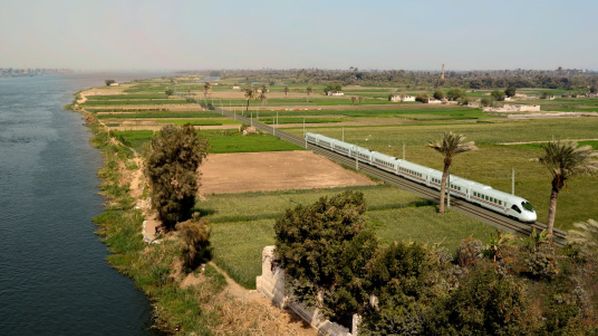SIEMENS Mobility has awarded Knorr-Bremse a contract to equip 15 of the Velaro Egypt high-speed EMUs it is supplying to Egypt’s National Authority for Tunnels (NAT) with braking and entrance door systems, together with an option for equipping another 26 trains.
The initial order will run from the last three months of 2023 through to the first quarter of 2026. The trains that Knorr-Bremse will be fitting out will run between Alexandria and other major Egyptian cities, carrying millions of passengers each year at speeds of up to 230km/h.
Siemens won an €8.1bn share of the contract to build 2000km of high-speed lines for NAT, including a €2.7bn initial contract for the first 660km route from Ain Sokhna to Marsa Matrouh and Alexandria. Dr Roland Busch, president and CEO of Siemens, described it as “the biggest order in the history of Siemens.”
The deal includes the supply of 41 eight-car Velaro high-speed trains, 94 four-car high-capacity Desiro EMUs for regional services and 41 Vectron freight locomotives.
The braking systems to be installed in the Velaro trains by Knorr-Bremse will include all bogie equipment, axle-mounted and wheel brake calipers, steel discs and sintered pads, as well as brake control systems with integrated smart braking computers. Compressed air will be supplied by enclosed PistonSupply Eco compressors and the braking system as a whole will be designed to deliver safe, highly efficient braking performance in Egypt’s hot, dusty and challenging desert climate.
Knorr-Bremse will supply service-proven and reliable pressure-tight doors, including boarding aids, for the Velaro trains through the group’s IFE brand. The doors will be designed to keep passengers safe as they enter and exit from the EMUs, helping to contribute to reliability of train connections.
In addition, Knorr-Bremse’s Evac brand will supply sanitary systems for 34 Desiro High Capacity regional passenger trains also built by Siemens Mobility for the Egyptian market – plus the option to supply another 60 sanitary systems. Equipping the initial 34 trains will involve installing a total of 136 ultra-reliable toilet systems, including a new type of bidet function.
For detailed data on fleet orders from around the world, subscribe to IRJ Pro.

